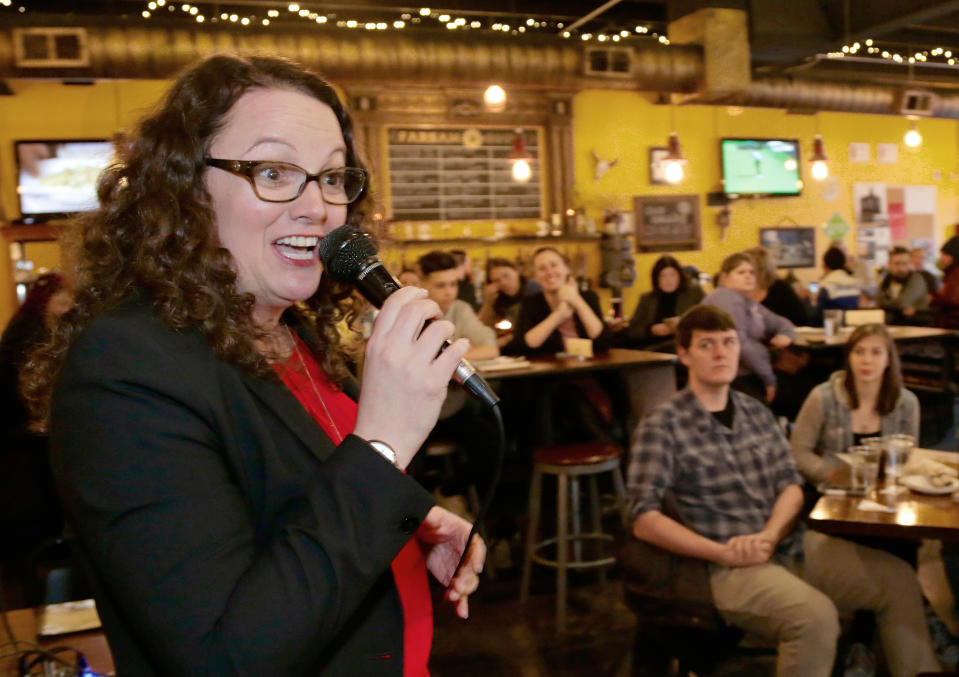Could soccer moms swing the House? Democrats hope so.

Remember the “soccer moms”? That 1990s term for politically moderate suburban women has fallen out of usage lately, but they’re still around, and a key voting bloc in the upcoming midterms. Frustrated with Washington and turned off by President Trump, they could deliver Congress to the Democrats in November. Or not.
Republican incumbents in heavily suburban districts hope they won’t pay the price of anger with the president in November.
“The GOP brand is severely tarnished, especially in the suburbs,” Evan Siegfried, a Republican strategist and author, told Yahoo News. “The suburbs are essentially becoming the new battleground, as opposed to battleground states, at least for the midterms. There are people who see what’s going on in government and say they don’t like it. They voted for a government to get stuff done in 2016.”
Nebraska’s Second Congressional District represents most of the Omaha metropolitan area. Rep. Don Bacon, a Republican, is the freshman incumbent in a seat the GOP captured in 2016. Trump won the district by 2 points.
Bacon has walked a careful line on Trump, opposing him on tariffs and on separating children from families at the border, but avoiding outright criticism.
“We’re seeing these suburban voters being turned off by what’s going on in the health care market,” Siegfried said. “Further, they’re also turned off by Trump’s behavior. They see all the drama in Washington.”
Republicans are banking on the idea that Bacon’s opponent, Kara Eastman, is too progressive for the district. But suburban women are worried about health care, and Eastman has focused her campaign around Medicare for all. Bacon voted for the American Health Care Act, which would have repealed parts of Obamacare. The bill failed in the Senate.

Bacon told Yahoo News he knows history is not in the Republican Party’s favor, but he wants people to vote based on him and not the president.
“I think if this race is about me and my opponent, I’m going to win in a landslide,” he said. “It will be closer if it’s more about Trump. Our district, though it’s not anti-Trump, it’s not pro-Trump either. It’s 50-50.”
In the suburbs of Cincinnati, Republican incumbent Steve Chabot is fending off a challenge from Aftab Pureval.
Chabot’s campaign recognizes that 2018 could be a difficult year, but it remains optimistic. Although Pureval has focused much of his campaign on health care, Cody Rizzuto, a spokesperson for Chabot, told Yahoo News they hear the most about tax cuts and the economy.
“I think a lot of Republican voters have seen how far left the Democrats have gone nationally,” Rizzuto said. “And I think it’s scared a lot of people and it’s concerning a lot of people how extreme some people on the left have gotten. I think that’s driving a lot of Republicans to get out and vote.”
Chabot and Bacon are still slightly favored to win their races, according to the experts. Both are running against candidates with a more progressive platform, showing that while the suburbs may be tired of Trump, they might not be on board with the national Democratic agenda.
Suburban enthusiasm has already surfaced in this year’s special elections. Turnout was relatively low in the rural parts of PA-18 and OH-12, but strong in the suburbs (of Pittsburgh and Columbus, respectively), which translated into a Democratic victory in one case, and a razor-thin margin for the Republican in what is usually a GOP stronghold in the other.
According to an NPR/Marist/PBS NewsHour poll conducted in July, 57 percent of suburban women strongly disapprove of Trump.

“The abyss that GOP candidates are looking at in suburban counties is a daunting challenge,” Nick Everhart, founder of Content Creative Media, a Republican ad firm, told Yahoo News. “History and an enthusiasm gap are just not on our side right now.”
In order to increase voter turnout, Republicans in many suburban districts have worked to frame their opponents as “Nancy Pelosi liberals” — even the ones who say they won’t vote for Pelosi to lead the party (or as speaker, if the Democrats win the House). Although Pureval has said he won’t back the House minority leader, Chabot said his opponent is selling “Nancy Pelosi’s liberal agenda to voters.”
“I think that a lot of people are going to be looking at this and saying about how we just do this from a perspective of turning out our base and get them as excited as possible,” Siegfried said. “And that’s part of the Nancy Pelosi push.”
In some competitive races, Trump has stepped in. He campaigned in the Ohio special election and made an endorsement in the Kansas gubernatorial primary, backing the eventual winners in both cases. He also campaigned for Rick Saccone, who lost his race, in Pennsylvania’s special election.
Nathan Gonzales, editor and publisher of Inside Elections, told Yahoo News many Republican candidates will want to localize their races, so that voters will focus on them and not the president.
Embracing Trump could have a high cost for Republicans in heavily suburban districts, but it could also motivate the base of voters who support the president. In some cases, a candidate might not have a choice as to whether the president decides to campaign.

“Trump’s national campaign blitz will no doubt generate effusive applause in Mississippi, rural West Virginia and northeastern Pennsylvania, but it is not helpful in suburban counties with college-educated voters,” Stuart Rothenberg, a senior editor at Inside Elections, wrote in Roll Call.
Republicans would have to lose more than just suburban seats to surrender control of the House, and Democrats have deployed candidates to urban/rural districts and rural districts that voted heavily for Trump. FiveThirtyEight, an analytic data site, said Democrats have a 75 percent chance of winning the House.
“Ultimately it’s up to Democrats to turn all of this frustration, energy and money into votes,” Gonzales said. “If all of this resistance doesn’t add up to more votes in the election, then it doesn’t really matter.”
_____
Read more from Yahoo News:
Facebook is ‘a surveillance system,’ sci-fi author Cory Doctorow says
Why Democrats and Republicans should worry about the Ohio results
Omarosa tweet raises the question: What is it about Trump and dogs?
How a change in U.S. asylum policy hurts victims of violence
Photos: ‘Dogs on the Beach’ — photographer documents the explosion of the canine beach culture


